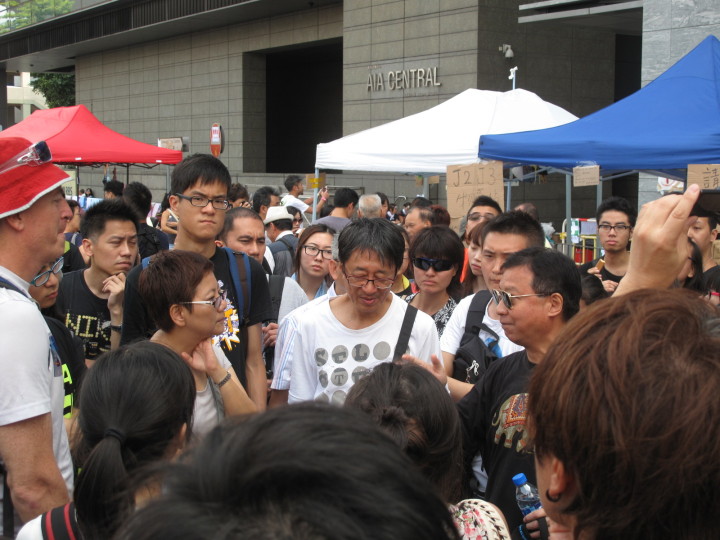In Hong Kong the entire territory is sectioned into district councils but these have limited powers over local affairs, with residents only able to vote into office councillors with very limited briefs which results in local attitudes of uncaring as no matter the issue it is seen that solutions are out of the locals power to effect any real change. This is why locals per district are forming their own organisations.
Chinese University’s magazine Varsity has just recently run an article, “Remaking our communities”, by its editors Megan Leung and Rubie Fan, that highlights this long-term problem and situation in Hong Kong and they give an example of one activists efforts to overcome this barrier to democracy (the article is given in full here).
“On a Sha Tin sidewalk, 22-year-old Wong Hok-lai fully extends his pull-up banner, sets up a folding table and some folding chairs. His mobile office is now complete and the rookie district councillor is ready to serve the community of Chung Tin, an area with a mixture of public housing estates, village houses and private residential developments.
“Wong is one of several young newcomers who were elected in November’s district council polls and the youngest district councillor of the current term. Like other young people who contested the first elections after 2014’s Occupy Movement, Wong hopes to make a difference in local government through the district council. But getting elected into the district councils does not mean being able to change the established system.
“Almost three months after his election, Wong still did not have an office in his constituency. Normally, the Housing Authority rents out offices to district councillors but because the previous district councillor did not move out immediately, Wong could only start applying to the Housing Authority for an office in January. He was finally allocated one in February.
“But he does not regret the time he spent managing his makeshift mobile office. Although he had to stop when it rained, Wong thinks that being on the street also has its advantages. It allowed him to have more interaction with local residents and, for Wong, understanding residents’ needs is the key to building the community.
“‘It is less out of touch for me to have a booth on street,’ he says. The district councils have long been criticised for failing to properly consult the community on issues that affect members of the public. For instance, two rain shelters in Quarry Bay [Hong Kong Island] that cost a total of HK$210,000 were removed after being judged as useless and in the way. Yet, most people in the neighbourhood only found out about the construction plan after they were already built.
“Wong says that to avoid such things happening, district councils should adopt a bottom-up approach and listen to residents’ opinions. ‘It is much more effective [[for community participation]] if they care about the issues,’ says Wong. ’After all, residents know best about their community’s problems.’
‘Before running for district councillor, Wong was a community officer for Shatin Community Network, which describes itself as a pragmatic localist* democratic organisation. Wong’s role was like that of a middleman between the government and residents; for example, he lobbied the Transport Department to expand green mini bus services in the district.
“After being elected as a district councillor, Wong is encouraged by his increased access to resources for community activities. And with his new title, officials and government bodies are more responsive to his requests for meetings and discussions.
“However, these may be the only differences Wong has encountered before and after he became a district councillor. The district council is only an advisory body under the current political system and the ultimate decision-making power for district policies and projects lies in the hands of government departments.
“‘Ultimately, the constitutional power of the district council is limited…’ Wong says.
“Local government has not always been so powerless. By the time of the handover in 1997, Hong Kong had three tiers of elected government, the district boards, the urban and regional councils and the Legislative Council. The urban and regional councils had greater policy-making power and financial autonomy than today’s district councils, and were responsible for cultural and leisure services and food and hygiene. But they were abolished in 1999 and their powers recentralised by the government.
“The district boards were renamed as the district councils which remained consultation bodies advising the government on the well-being, infrastructure and environment of the various constituencies without any real administrative power.
“In his 2014 Policy Address, Chief Executive Leung Chun-ying promised to give more power to the district councils, saying ‘district issues can be addressed at district level and local opportunities capitalised locally’. His government launched the Signature Project Scheme in 2013 which granted HK$100 million for each district to implement projects in the community that were proposed, discussed by and agreed upon in the district council.”
The article points out a practical way forward for Hong Kong in its political development as so much energy is placed on the voting procedures for the Chief Executive and as has been proved, it is almost impossible to move the powers to change this as no doubt Beijing wants to control who calls the shots in the territory but is this of absolute priority in the affairs of everyday?
What is important is revamping and refurbishing matters in the districts and when residents can really have a say locally in the neighbourhoods, Hong Kong will change for the better. Also, collectively, with that grass roots voice, matters on the higher levels can also be changed for the better, even right up to the top level where so far people have assumed they will never have influence.
- Localist: has become to mean anti Chinese mainland whereas it could be taken simply as someone or group primarily interested in local affairs.
See original article at: http://varsity.com.cuhk.edu.hk/index.php/2016/03/district-council-reform-limitations/






